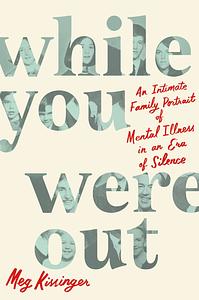Take a photo of a barcode or cover
867 reviews for:
While You Were Out: An Intimate Family Portrait of Mental Illness in an Era of Silence
Meg Kissinger
867 reviews for:
While You Were Out: An Intimate Family Portrait of Mental Illness in an Era of Silence
Meg Kissinger
This is a must read book about mental illness and how important love and understanding truly are.
emotional
informative
inspiring
sad
medium-paced
Incredibly raw, sad, inspiring, and accurate portrayal of the reality of mental illness and its impact on the family
emotional
reflective
medium-paced
dark
emotional
informative
sad
medium-paced
dark
inspiring
reflective
sad
medium-paced
dark
emotional
informative
inspiring
sad
medium-paced
I spent a lot of the first half of this book being annoyed at how the author was seemingly unaware of her family’s immense privilege. To those readers who come from families with histories of severe mental illness, and who, seeing the title of the book, expected to feel kinship with another family’s struggles, it’s hard to find that here. For most, the opportunity to be kicked out of a country club for failure to pay dues is not relatable, as one of many examples. Though they had massive problems with tragic consequences, their family remained loving, supportive, and close. Much of the family history is filled with anecdotes about the times she lived in. “We played outside unsupervised until the streetlights came on” and other cliches. We have far fewer anecdotes about the actual realities of living with someone experiencing a psychotic break.
It is in the last third of the book, where the author begins to cover the failure of the mental health system in her journalism where the book redeemed itself, and became incredibly moving and informative. Her telling of how she retrieved her family history was also a good read.
It is in the last third of the book, where the author begins to cover the failure of the mental health system in her journalism where the book redeemed itself, and became incredibly moving and informative. Her telling of how she retrieved her family history was also a good read.
Part 1: 2.5 ⭐️
Part 2: 4 ⭐️
Part 3: 4 ⭐️
3.5 stars overall.
Part 1 of this book was a memoir of author’s family; part 2 was some investigative journalism on the U.S mental health system and applying that to stories of individuals outside and within the family; and Part 3 seemed to be the author’s own therapeutic journey of attempting to take some accountability for her part in things that occurred, finding forgiveness, and tying everything together.
I really enjoyed the investigative journalism section of this book. It reminded me of Matthew Desmond‘s work in that it was story like enough to draw readers in and make data about mental health systems more accessible/applicable/enjoyable for the average reader. I wish it was more than 60 pages.
The first part was not for me - I found it a bit hard to follow, overly detailed, and not particularly compelling.
I was also unsettled by some things the author said and/or how she said them. Unfortunately, part 1 was 2/3 of the book.
However, I can understand why the author made this book a memoir. She wrote that “readers [have] lots of other things they’re more interested in than the plight of someone with depression or schizophrenia. Find a way to make people care. Get readers to see the world the way that your subjects see it, feel what they are feeling” and I imagine this is what she set out to do (on top of also working through her past as she stated).
I would read more investigative journalism work by this author.
Part 2: 4 ⭐️
Part 3: 4 ⭐️
3.5 stars overall.
Part 1 of this book was a memoir of author’s family; part 2 was some investigative journalism on the U.S mental health system and applying that to stories of individuals outside and within the family; and Part 3 seemed to be the author’s own therapeutic journey of attempting to take some accountability for her part in things that occurred, finding forgiveness, and tying everything together.
I really enjoyed the investigative journalism section of this book. It reminded me of Matthew Desmond‘s work in that it was story like enough to draw readers in and make data about mental health systems more accessible/applicable/enjoyable for the average reader. I wish it was more than 60 pages.
The first part was not for me - I found it a bit hard to follow, overly detailed, and not particularly compelling.
I was also unsettled by some things the author said and/or how she said them. Unfortunately, part 1 was 2/3 of the book.
However, I can understand why the author made this book a memoir. She wrote that “readers [have] lots of other things they’re more interested in than the plight of someone with depression or schizophrenia. Find a way to make people care. Get readers to see the world the way that your subjects see it, feel what they are feeling” and I imagine this is what she set out to do (on top of also working through her past as she stated).
I would read more investigative journalism work by this author.
I listened to this memoir in the car. It's narrated by the author, who does an excellent job. The story is enormously heartbreaking, but equally beautiful.




